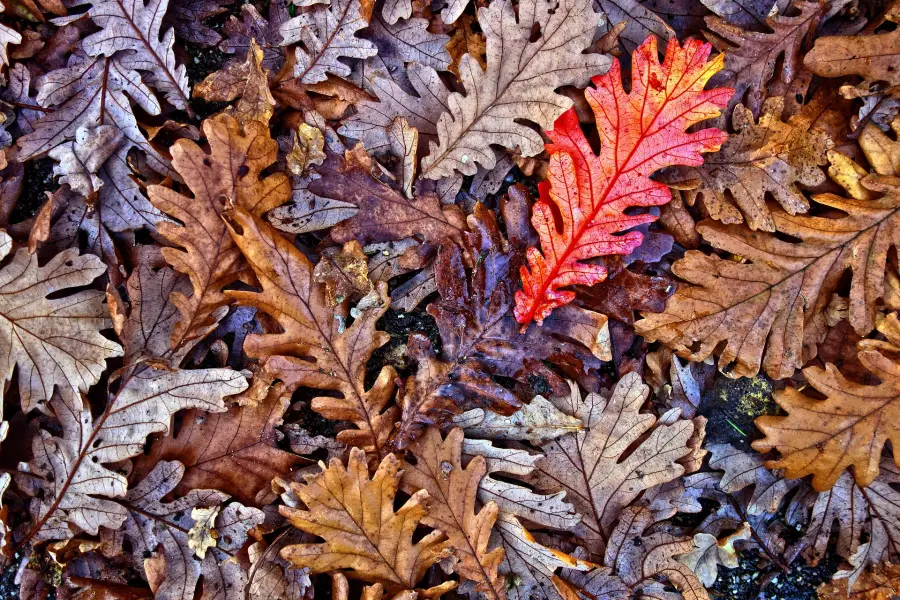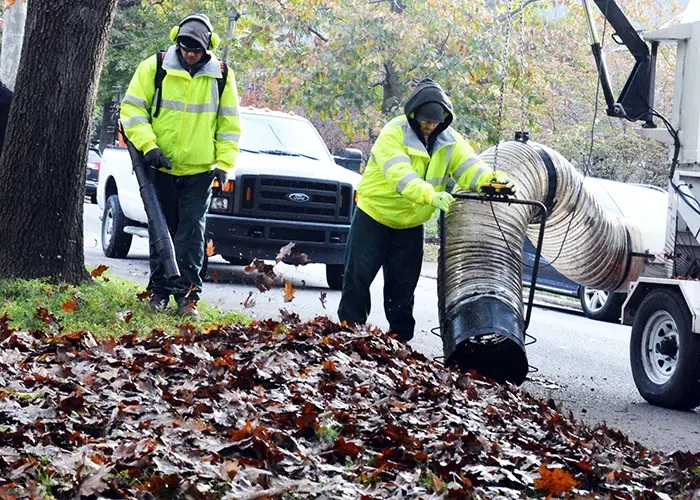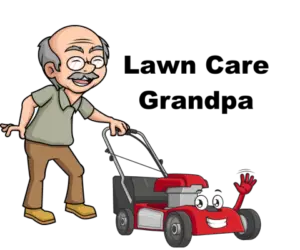Your yard is a living, breathing ecosystem which consists of countless inputs, processes, and outputs. Waste products are a part of the latter aspect, which means landscapers must have some sort of recycling or waste disposal strategy.
Burning wet leaves requires extra kindling, 40′ to 50′ of clearance from structures or tree lines, and nearly double the burn time. The use of accelerants is dangerous and not advised. The burning of leaves, wet or dry is tightly governed in most towns and cities by local ordinance.
Organic matter, such as leaves, is a common waste product that many people often repurpose as compost. However, in some cases, the sheer quantities are just too much. Is burning a possible solution? How does society (and the law) view the act of burning leaves?

Contents
Can Wet Leaves Be Burned?
If your property requires multiple rakings per week, you’ll find that all your (and your descendants’) composting needs are met very quickly, especially during the fall. It can become overwhelming especially if there are several large mature trees on your lot or property. If they are piled up and have been rained on, can these wet leaves be burned?
Leaves are a great addition to an organic fertilizer mix but, sometimes, one only needs so much compost. In such situations, you will have to explore disposal options. Naturally, burning both wet and dry leaves comes to mind. Though it is the wet leaves that will tend to give you the most problems.
Wet leaves can be burned as long as the added effort, smoke created, and longer burn time is kept in mind. Due to the dampness there will most definitely be a need for more kindling. With burning wet leaves there will be considerably more smoke created, and with longer burn times this could add up.
Surely, burning leaves is pretty straightforward…right?
Well, yes and no. To answer whether you can burn leaves is yes.
Best Practices When Burning Leaves
The best approach is to set your leaves up in piles. These piles must be in spots that will isolate the fire. We also recommend that you set up the burn piles far away (40-50 feet) from any structures and plants. Additionally, avoid using flammables like oil, gasoline, etc. to start the fire because this will produce toxic smoke.
Not only will the smoke have harmful elements when using accelerants, these quickly burning fuels can cause a small utility fire to transform into a dangerous fire hazard. Having open flames and especially large open fires near homes and in neighborhoods is risky at best. More on the dangers and legal issue later.
Dry leaves burn easiest and pass on flames to surrounding leaves at a very high rate. Sizeable quantities of smoke may also be produced by burning larger leaf piles. The smoke may also have traces of the leaves’ scent as it burns.
The Difficulties Of Burning WET Leaves
Wet leaves, on the other hand, are a little trickier. Naturally, it takes longer for them to catch fire and, even if they do, the fire won’t spread to other leaves as easily. You might find yourself constantly rekindling your leaf pile due to a weak fire.
The moisture in wet leaves also holds numerous chemicals and nutrients that typically produce thicker smoke than dry leaves when they are burnt. These chemicals are known as hydrocarbons.
If blowing your own leaves for mulching, burning, or pickup a good blower, vacuum, or mulcher is your best friend. I have an option that I recommend to most homeowners. There is a three in one machine that will fit all of your wet leaf needs that you can get from Amazon: BLACK+DECKER 3-in-1 Electric Leaf Blower, Leaf Vacuum, Mulcher
Should You Burn Wet Leaves
Now, let’s take a look at whether you should burn your leaves. This is a little tricky because it depends on your particular circumstances. Like with a lot of things, there are several factors to consider.
Burning leaves and other things like brush and even trash should not be done inside of city limits or in residential areas of any kind. Open flame burning of debris should only be done in wide open spaces, on your own property, and far away (minimum 40-50 feet) from structures and tree lines.
There are several factors that point to abstaining from the practice, but there are some instances where it could make sense and be a help, especially to large landowners.
More from LawncareGrandpa.com…
- Is A Leaf Blower Silencer A Thing? (Revealed)
- Are Leaf Blowers Worth It? Lawn Care Experts Weigh In
- Is A Columbia Snowblower A Good Choice? (Revealed)
Burning Wet Leaves And The Law
The first is the law of the land.
Various municipalities and homeowner’s associations across the U.S. and Canada have regulations and by-laws that limit or outright prohibit the backyard burning of waste. This is due to many factors, some of which include: pollution, fire spread risk, and the dangers of fire related injuries.
We will dive a little deeper into the legality of leaf burning later on in this article. It should suffice here to say that most all cities of most every size in the united states will have laws on the books that govern most forms of open flame debris burning.
Property Size, Location, And Proximity To Neighbors
The second major factor is your property size and, by extension, your proximity to neighbors.
The folks next door might not take too kindly to the smell of smoke coming from just over the fence. At best, they may find it annoying and at worst they may suffer ill effects after being exposed.
As such, we highly recommend not burning your leaves if you have a small yard with very close neighbors. However, if you are on a very large or isolated property, chances are no one will even know what you’re doing.
The Health Risks Of Burning Leaves Wet Or Dry
The next factor to consider is the potential health impact on nearby people or animals.
Needless to say, inhaling smoke of any kind is rarely a good idea. Habitually burning leaves can have serious repercussions for the lungs. Worse still is if any exposed persons or animals are allergic to the leaves being burnt. Sufferers of respiratory conditions like asthma are particularly vulnerable, so beware.
Remember the hydrocarbons we spoke of earlier? Well, they can be pretty problematic too. Once released in the form of smoke, hydrocarbons can be a mild to severe irritant.
Hydrocarbons can affect the throat, nose, lungs, eyes, and even some types of sensitive skin. Medical research has also indicated that prolonged or habitual exposure to hydrocarbons can result in lung cancer.
There are much greater levels of these hydrocarbons released into the air when burning wet or damp leaves. The amount of smoke is noticeably more coming from a burning pile of wet leaves versus a dry one. All of the problems and health concerns associated with them are exponentially more present when burning wet leaf piles.
Leaf smoke can also have similar effects on animals. Pets and livestock often have more sensitive noses than humans and may, therefore, experience higher levels of irritation.
One reason we recommend burning your leaves away from buildings is to prevent the smoke from entering confined spaces and affecting occupants. The main danger from this is carbon monoxide, another byproduct of burning.
Carbon monoxide is hazardous because, once inhaled, it enters the bloodstream and binds to red blood cells. This then limits the amount of oxygen each cell can carry and, ultimately, the brain and body may experience oxygen deprivation.
Leaf Burning And Fire Risk
Another health and safety concern is the inherent fire risk. Some areas such as California are particularly susceptible to wildfires and an ill-thought burn pile might be just the trigger to start one.
You should also consider whether burning your leaves is beneficial for the wider environment. Smoke is a form of air pollution that can cause serious harm to surrounding flora and fauna.
That said if you must burn your leaves ensure you do it on a still day with clear skies because the wind will blow the smoke in undesired directions. You should also try to burn your leaves when the neighbors that would be most affected aren’t around.
Of course, the most important thing to establish is whether burning leaves is legal in the first place.
If you are in a bind, you will have to find another way to get rid of your leaf problem. One solution is to shred the leaves and mulch them into your lawn or garden. You could also sign up for a professional garden waste disposal service that will periodically pick up your leaves and get rid of them.
Is It Illegal To Burn Leaves?
As we’ve already seen, burning leaves in your backyard may have health-related (or social) consequences.
But what does the law say? Does it even have a say?
Well, in a lot of cases, it does.
While some states may have state-level law governing against “open burning” (using fire to dispose of waste material), this type of thing is often left under the jurisdiction of local municipalities. In most every case these local authorities either tightly restrict the practice or outright ban it.
Illinois, for example, does not have any outright legislation governing this so local towns and cities take it upon themselves to issue ordinances and guidelines. California is a little stricter about this issue, as you can imagine. So it all depends on where you are.
With the rise of environmental consciousness, the law is taking a continually stricter stance on activities like burning leaves, and for good reason.
As such, we highly recommend that you peruse your state’s law as well as your local municipal ordinances before lighting up your debris.
Alternatives To Burning Leaves (Wet Or Dry)

With the strict local restrictions on most types of debris burning you will find in the United States, there must be some other options provided by municipalities and counties to help home and land owners with their leaf pileup. As a matter of fact there is.
Most cities and towns have some sort of solution for the disposal of leaves and other yard debris. There are many ways this is handled from free drop off areas to curbside pickup of either piled or bagged leaves. Check your government services and you should find your local option.
Your city or town is probably your best option for getting rid f excessive amounts of leaves. Your tax dollars have set up many programs that you and others are not aware of. These programs employ people in your area and provide services for residents.
Sometimes these departments can become ‘red tape’ nightmares, but in general they are there to make the lives of citizens of a town or area easier. There are normally times for leaf pickup in most cities curbside and there is no exception for wet leaves.
We all know that wet leaves can become quite heavy, but this contingency should be accounted for and built into the system. This could be your best alternative to rid yourself of damp or even dry leaves.
The Final Touches On Burning Wet Leaves…
If you are certain that burning wet leaves is your only option, and waiting for the pile to dry is not, then be ready for extra work and mess in the process. The extra kindling, excessive smoke, and extended burn times will make for some unpleasant work.
There are other options as well. Just keep them in mind. If you are within city limits, your extra taxes paid usually entitles you to some version of leaf pickup or at least drop-off services. Check your local government schedules for times and locations.
When burning wet or dry leaves it is vital that you find out your local laws and ordinances. There may even be restrictions over and above these set by homeowner associations. These may be at times an inconvenience, but would you really want some of your neighbors starting leaf bonfires two houses down from yours.
Sometimes burning wet leaves could make sense, but many times other options will save time, effort, and the headache (maybe literally).
More articles you will like…
- Is There Actually A Japanese Blue Maple Tree? (Answered)
- Is There A Lemon Orange Tree? (Experts Explain)
- Pine Tree Roots: How Far They Spread and How To Remove Them
References
http://www.epa.state.il.us/air/permits/openburn/open-burning-brochure.pdf
https://www.familyhandyman.com/article/heres-why-burning-leaves-is-a-bad-idea/
